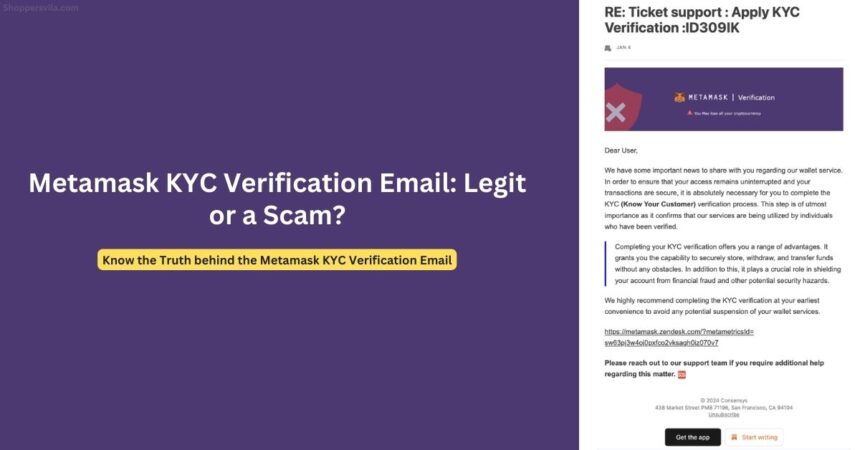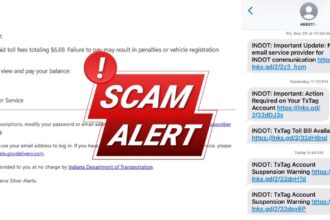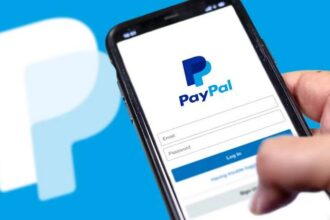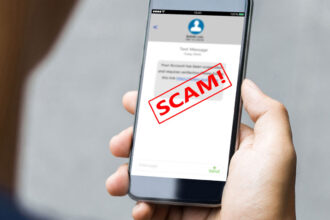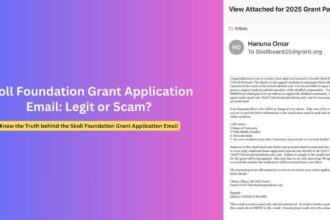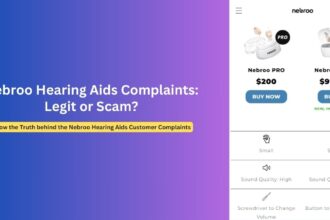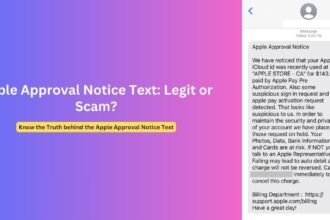In the world of cryptocurrency, security threats evolve as quickly as the technology itself. Among the most pervasive scams targeting crypto users today are fake “Know Your Customer” (KYC) verification emails claiming to be from MetaMask, one of the most popular cryptocurrency wallets. These sophisticated phishing attempts have already claimed numerous victims, draining wallets and leaving users devastated. This article explores how these scams operate, why they’re effective, and most importantly, how you can protect yourself.
Overview of Metamask KYC Verification Email Scams
MetaMask KYC scams follow a deceptively simple yet effective formula. Scammers send emails that appear to come from MetaMask’s support team, claiming that users must complete a KYC verification process to continue using their wallet services. These emails typically create a false sense of urgency, warning that failure to comply will result in account suspension or asset loss.
The reality is stark: MetaMask never requires KYC verification. As a self-custodial wallet, MetaMask operates on a fundamentally different model than centralized exchanges. It doesn’t hold your funds, doesn’t collect your personal information, and most importantly, has no authority to freeze or restrict your access to blockchain assets.
“These scammers are exploiting a fundamental misunderstanding about how self-custodial wallets work,” explains cybersecurity expert Daniel Trauner. “Unlike centralized services, MetaMask doesn’t ‘hold’ your assets or control your accounts. The scammers count on users not understanding this distinction.”
Email Patterns: How to Spot the Deception
The fake KYC emails follow several recognizable patterns. By familiarizing yourself with these elements, you can quickly identify potential threats:
1. Sender Addresses
Legitimate MetaMask emails only come from the following domains:
- [email protected]
- [email protected]
- [email protected]
- [email protected]
- [email protected]
- [email protected]
Scam emails typically use deceptive sender addresses that might look similar at first glance but contain subtle differences. Recent examples include:
- Consensys MetaMask <[email protected]>
- MetaMask-Support <[email protected]>
- MetaMask Wallet <[email protected]>
2. Message Content and Tone
Scam emails share common language patterns:
- Urgent tone: Phrases like “immediate action required” or “you may lose all your cryptocurrency”
- Regulatory claims: False statements about compliance requirements or financial regulations
- Generic salutations: Opening with “Dear User” rather than a personalized greeting
- Poor grammar: Subtle language errors that legitimate companies would catch in proofreading
- Threats of account restriction: Claims that your wallet will be “suspended” or “restricted”
3. Link Destinations
Perhaps the most dangerous element of these emails is the malicious link. When examined closely, these links rarely point to official MetaMask domains. Instead, they direct to:
- Lookalike domains with slight misspellings (e.g., “metanask” instead of “metamask”)
- Redirect links through services like Substack or Bitly
- Complex URLs with random character strings
Is the MetaMask KYC Verification Email Legitimate?
The answer is unequivocally no. According to MetaMask’s official support documentation:
MetaMask will never send you unsolicited emails. MetaMask will not and cannot initiate email correspondence with you, unless you request it through support, or sign up for marketing updates.
MetaMask has repeatedly clarified that:
- They do not collect personal information (including email addresses) when you create a wallet
- They have no KYC requirements for standard wallet usage
- They cannot and will not restrict access to your cryptocurrency
- They do not operate as a financial services provider subject to KYC regulations
The only scenario where you might legitimately encounter KYC requirements is when using specific integrated services within MetaMask, such as when purchasing cryptocurrency through third-party providers or signing up for the MetaMask Card, which explicitly requires KYC directly with the provider—not through email solicitation.
Red Flags: Eight Warning Signs of KYC Verification Scams
To help you quickly identify potential scams, watch for these eight critical warning signs:
- Unsolicited contact: Any email claiming to be from MetaMask that you didn’t specifically request
- Urgent deadlines: Claims that your access will be restricted if you don’t act quickly
- Requests for your Secret Recovery Phrase: No legitimate service will ever ask for this
- Suspicious links: URLs that don’t exactly match metamask.io or support.metamask.io
- Regulatory claims: Statements about MetaMask needing to comply with financial regulations
- Generic addressing: Emails that don’t address you by name or username
- Poor design quality: Emails with inconsistent branding, misaligned logos, or unprofessional appearance
- Threats: Any language suggesting your assets are at risk or your account could be closed
A real-world example reported on Reddit describes an email with the subject line “RE: Ticket support: Apply KYC Verification: ID309IK” that began with “Dear User” and warned “You May lose all your cryptocurrency.” The email came from a Substack address—a clear indication of fraud.
How to Protect Yourself from MetaMask KYC Scams
Protecting yourself from these sophisticated scams requires vigilance and a clear understanding of how MetaMask actually operates:
1. Verify All Communication
If you receive an email claiming to be from MetaMask:
- Check the sender: Verify the exact email address against the legitimate addresses listed earlier
- Don’t click links: Access MetaMask’s support site directly by typing support.metamask.io in your browser
- Contact official support: Use the “Start a Conversation” button on MetaMask’s official support site to confirm if the communication is legitimate
2. Implement Strong Security Practices
- Use a hardware wallet: For significant cryptocurrency holdings, consider a hardware wallet like Ledger or Trezor
- Enable additional security features: If your email provider offers advanced security features, enable them
- Keep your software updated: Ensure your browser, MetaMask extension, and operating system are current
- Use separate email addresses: Consider using different email addresses for different cryptocurrency services
3. Educate Yourself on How MetaMask Works
Understanding the fundamental principles of self-custodial wallets provides powerful protection:
- MetaMask is non-custodial, meaning they don’t hold your cryptocurrency
- Your funds exist on the blockchain, not within MetaMask itself
- No one, including MetaMask, can restrict your access to blockchain assets
- Your Secret Recovery Phrase is the only way to access your funds—never share it
4. Report Suspicious Activity
If you encounter a suspected scam:
- Report it to MetaMask via their official support channel
- Forward the email to your email provider’s phishing report address
- Share information (without clicking links) with cryptocurrency communities to warn others
- Report to relevant authorities like the FBI’s Internet Crime Complaint Center (IC3) or equivalent in your country
The Psychological Tactics Behind KYC Verification Scams
Understanding the psychological manipulation these scammers employ can help you resist their tactics:
- Fear of loss: Creating panic about potential asset forfeiture
- Authority exploitation: Impersonating a trusted service provider
- Urgency creation: Imposing artificial time constraints to force quick, unthinking reactions
- Familiarity bias: Using familiar branding and language to lower your guard
- Regulatory confusion: Exploiting uncertainty about changing cryptocurrency regulations
“These scams are particularly effective because they target both our trust in established services and our fears about regulatory compliance in an evolving space,” notes Dr. Priya Singh, a cybersecurity psychologist. “Even sophisticated users can be vulnerable when caught off-guard.”
Conclusion: Vigilance in the Self-Custodial Era
The rise of MetaMask KYC scams highlights a broader challenge in the cryptocurrency ecosystem: balancing the freedom of self-custody with the responsibility of self-security. While traditional financial institutions shoulder much of the security burden for their users, self-custodial wallets like MetaMask place that responsibility squarely on the individual.
This fundamental shift requires a new security mindset. By understanding that MetaMask will never solicit KYC verification via email, recognizing the warning signs of scams, and implementing robust security practices, you can enjoy the benefits of self-custody while minimizing risks.
Remember: in cryptocurrency, skepticism is your strongest security feature. When in doubt, verify through official channels, and never share your Secret Recovery Phrase with anyone—not even MetaMask itself.
Stay vigilant, stay informed, and stay secure in your cryptocurrency journey.
